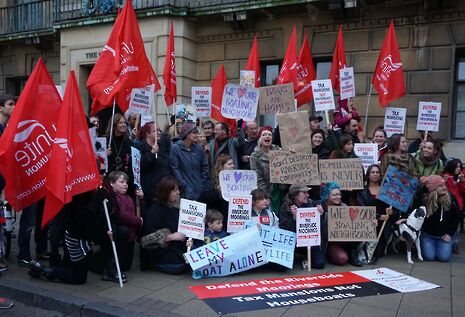Protest held outside Guildhall against proposal to ban house-boats on Riverside
People gathered on Market Square in response to a proposal for mass evictions of house-boats in a council consultation document

Cambridge residents and members of Unite the Union picketed a Guildhall meeting on Thursday evening last week, over proposals by the Strategy and Resources Scrutiny Committee of Cambridge City Council to prohibit mooring of house-boats on the wall in the Riverside area of the river Cam, and to evict those already moored there.
The proposal to remove the house-boats from Riverside has not been formally adopted by the council, but was included in a consultation document requesting the views of residents on mooring policy. The consultation will proceed for 12 weeks from the 27th of October.
Attending the protest was Riverside resident Hilary Cox Condron, who told Varsity that many of her neighbours live on house-boats. She said that she has campaigned repeatedly for the right of the Riverside boat-dwellers to remain at their current moorings, and called the council’s proposal a betrayal of Cambridge’s “long history of tolerance and inclusivity”, adding: “breaking up our community, potentially making our neighbours homeless, cuts at the heart of our community”.
She argued that the measure would address the problem “clumsily, with prejudice”, and spoke of the toll it had taken on those who live on the house-boats, saying: “It’s terrible to see our friends and neighbours living with the stress of this.”
She went on to extol the virtues of living on a house-boat, saying that it was a “more eco-friendly lifestyle”.
In a statement before the event, a spokesperson for Unite said that the branch believes that the proposal “will have a profound negative impact on those boaters and the wider community”, adding, “pushing people from their homes into the failures of the overpriced housing free market is the complete opposite of what we should be doing.”
Andrew Osborne, Chair of Unite’s General Engineering, Manufacturing and Servicing Regional Industrial Sector Committee for the London and Eastern Region, has written to the executive councillor for Finance and Resources Richard Robertson about the proposal, which he says has left residents of house-boats “very nervous and fearful about their housing situation”. He has requested that the current consultation be discontinued and replaced with one that “addresses [house-boat residents’] concerns and “does not threaten the riverside boaters with eviction from their current moorings.”
Mr Robertson told Cambridge News: “There is no question of any decision being made on this before March. There is no question of anybody losing their place in the city.”
In another piece of controversy, a spokesperson from Unite has alleged that the vote on the proposals did not take place in conditions of “absolute probity” on the part of the council. He told Varsity that there was an unaddressed conflict of interests in the vote on the consultation document, because the chair of the Strategy and Resources Scrutiny Committee, Dr Peter Sarris, is also a Fellow at Trinity College.
The spokesperson argued that this constitutes “a vested interest” which under usual protocol would require Dr Sarris to absent himself from the vote, a step Dr Sarris did not take. However, Varsity has been informed that Dr Sarris was not required by the guidelines to absent himself from the vote, only to declare his interest, which he did at the meeting.
A spokesperson for the council said: “In such instances it is for councillors to satisfy themselves that they have correctly disclosed relevant interests in their register of interests entries and that there are no additional items they wish to disclose for a particular item.”
While the consultation document does note that one reason for adopting a new policy on house-boats is the dramatic increase in the number of vessels using the Cam – a fact highlighted by the Unite spokesperson – it does not make specific reference to college rowing teams.
This is not the first time that the council has taken soundings on a proposal to ban house-boats from the Riverside wall. A consultation in early 2013 asked for opinions on the same measure, and found that 25 per cent of local residents would back such a measure
 News / Uni offers students £55k in payouts31 October 2025
News / Uni offers students £55k in payouts31 October 2025 News / Uni error forces deeper spending cuts31 October 2025
News / Uni error forces deeper spending cuts31 October 2025 News / College rowing captains narrowly vote to exclude trans women31 October 2025
News / College rowing captains narrowly vote to exclude trans women31 October 2025 News / Students launch women’s society excluding trans women31 October 2025
News / Students launch women’s society excluding trans women31 October 2025 News / Students allowed to use AI, says new uni guidance31 October 2025
News / Students allowed to use AI, says new uni guidance31 October 2025









